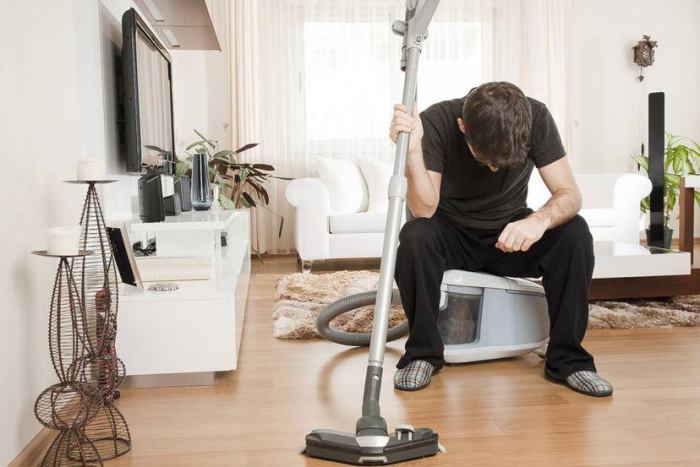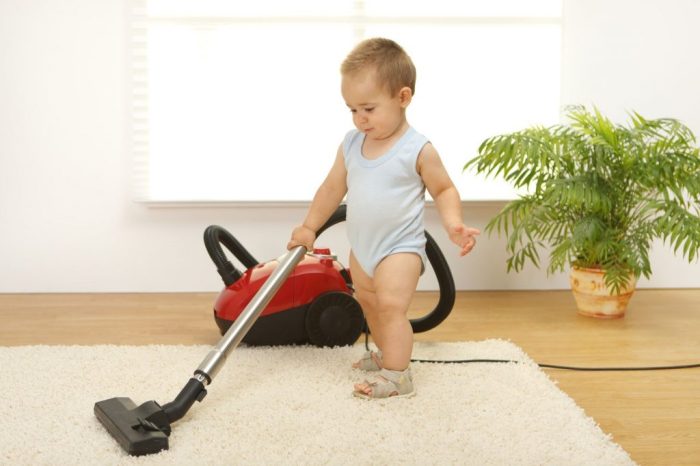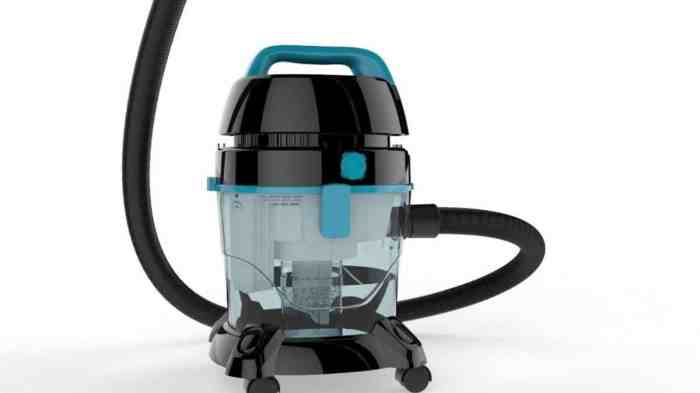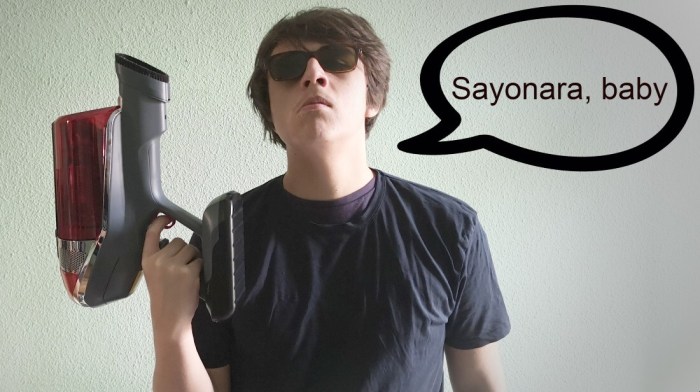Quieres que yo la aspiradora, a phrase that echoes through Spanish-speaking communities, invites us on a journey to explore its cultural significance, historical evolution, and the nuances of its usage. This exploration promises to unveil the rich tapestry of meaning woven into this seemingly simple expression.
From its literal translation to its figurative interpretations, we will delve into the contexts where “quieres que yo la aspiradora” finds its place, examining the social norms and etiquette that shape its utterance. Along the way, we will uncover the unique characteristics that distinguish this phrase from its counterparts in other languages and cultures.
Definition and Meaning
The Spanish phrase “quieres que yo la aspiradora” literally translates to “do you want me to vacuum it?” in English. This phrase is commonly used in everyday conversations to ask someone if they want the speaker to vacuum a specific area or item.
Examples
Here are a few examples of how the phrase “quieres que yo la aspiradora” might be used in everyday conversations:
- “¿Quieres que yo la aspiradora la alfombra?” (“Do you want me to vacuum the carpet?”)
- “¿Quieres que yo la aspiradora el coche?” (“Do you want me to vacuum the car?”)
- “¿Quieres que yo la aspiradora el sofá?” (“Do you want me to vacuum the sofa?”)
Cultural Context

The phrase “quieres que yo la aspiradora” is deeply embedded in Spanish-speaking communities, carrying cultural significance and reflecting social norms. Its origins can be traced back to traditional gender roles and the historical division of household chores.
Historical Origins and Evolution
In many Spanish-speaking cultures, domestic responsibilities were traditionally assigned based on gender. Women were primarily responsible for household cleaning and maintenance, including vacuuming. The phrase “quieres que yo la aspiradora” emerged as a way for women to playfully delegate this task to their male partners or housemates.
Social Norms and Customs, Quieres que yo la aspiradora
Over time, the phrase has evolved to become a humorous and affectionate expression used within families and close relationships. It is often uttered in a teasing or flirtatious manner, suggesting that the speaker is willing to perform the task if their partner or companion desires it.
Quieres que yo la aspiradora? ¡Claro que sí! Pero antes, necesito repasar la peppered moth lab answer key . La polilla moteada es un gran ejemplo de cómo los organismos se adaptan a su entorno. ¡Y ahora, de vuelta a la aspiradora!
The phrase has also gained popularity in popular culture, appearing in movies, TV shows, and music lyrics.
Variations and Synonyms

The phrase “quieres que yo la aspiradora” is a common way to ask someone if they want you to vacuum the floor. There are a few common variations and synonyms of this phrase, each with its own subtle differences in meaning and usage.
Common Variations
- ¿Quieres que aspire?– This is a more direct way of asking someone if they want you to vacuum the floor. It is often used when you are already in the room where the vacuuming needs to be done.
- ¿Me dejas aspirar?– This phrase is more polite than “¿Quieres que aspire?” and is often used when you are asking someone for permission to vacuum the floor.
- ¿Puedo aspirar?– This phrase is similar to “¿Me dejas aspirar?” but is more formal. It is often used when you are asking someone for permission to vacuum the floor in a public space, such as a library or office.
Table of Variations
| Variation | Meaning | Usage ||—|—|—|| ¿Quieres que yo la aspiradora? | Do you want me to vacuum the floor? | General use || ¿Quieres que aspire? | Do you want me to vacuum? | Used when you are already in the room where the vacuuming needs to be done || ¿Me dejas aspirar? | Can I vacuum the floor? | More polite than “¿Quieres que aspire?” || ¿Puedo aspirar? | May I vacuum the floor? | More formal than “¿Me dejas aspirar?” |
Figurative and Extended Meanings
Beyond its literal interpretation, the phrase “quieres que yo la aspiradora” has acquired figurative and extended meanings. It has become a versatile expression that conveys various emotions, intentions, and messages.
In certain contexts, the phrase is used to express frustration or exasperation. It implies that the speaker is feeling overwhelmed or burdened by a task or situation and is seeking assistance or relief.
For instance, in the following dialogue, the speaker uses the phrase to convey a sense of exasperation:
“Estoy harto de limpiar esta casa. ¿Quieres que yo la aspiradora?”(“I’m tired of cleaning this house. Do you want me to vacuum it?”)
In other contexts, the phrase can be used to convey a sense of humor or irony. It suggests that the speaker is playfully exaggerating the effort or difficulty involved in a task.
For example, in the following joke, the phrase is used to create a humorous effect:
“Mi esposa me dijo: ‘¿Quieres que yo la aspiradora?’ Le respondí: ‘¡Claro, pero no esperes milagros!'”(“My wife asked me: ‘Do you want me to vacuum?’ I replied: ‘Sure, but don’t expect miracles!'”)
The phrase “quieres que yo la aspiradora” has also found its way into literature and poetry. It has been used by authors to convey a range of emotions and ideas.
In the poem “Canción de la aspiradora” by the Chilean poet Pablo Neruda, the phrase is used to symbolize the mundane and repetitive nature of domestic life:
“Quiero que tú me la aspiradora,que me la aspiradora,que me la aspiradora,hasta que se me acabe el alma.”(“I want you to vacuum it,vacuum it,vacuum it,until my soul is gone.”)
Usage and Etiquette: Quieres Que Yo La Aspiradora

The phrase “quieres que yo la aspiradora” is generally used in informal settings, such as among friends, family, or colleagues. It is not considered appropriate for formal or professional contexts, such as business meetings or academic presentations.
When using the phrase, it is important to be respectful and considerate of the other person. The tone should be polite and friendly, and the phrase should not be used in a demanding or aggressive manner. It is also important to be aware of the cultural context in which the phrase is being used, as its meaning and usage may vary depending on the country or region.
Appropriate Contexts
- Asking a family member or friend to help with a household chore
- Offering to help a colleague with a task
- Asking for assistance from a neighbor
Inappropriate Contexts
- Asking a stranger for help
- Using the phrase in a formal or professional setting
- Using the phrase in a demanding or aggressive manner
Cultural Comparisons

The Spanish phrase “quieres que yo la aspiradora” directly translates to “do you want me to vacuum it?” in English. Similar phrases or expressions exist in other languages and cultures, reflecting the common need to communicate about household chores.In many cultures, it is customary to ask for permission or offer assistance before performing a task for someone else, especially in shared spaces like a home.
The phrase “quieres que yo la aspiradora” conveys a polite and respectful approach to offering help, indicating a willingness to contribute to the upkeep of the shared space.However, there are subtle cultural differences in how such phrases are employed. In some cultures, it is more common to use direct requests, while in others, indirect or suggestive language is preferred.
For example, in some Asian cultures, it is considered more polite to make a suggestion rather than a direct request, using phrases like “Would you like me to vacuum it?” or “Perhaps it would be helpful if I vacuumed it.”The
Spanish phrase “quieres que yo la aspiradora” falls somewhere in between these extremes, striking a balance between politeness and directness. It acknowledges the other person’s autonomy while also expressing a willingness to assist. This balance makes the phrase suitable for use in a variety of social contexts, from close friends and family to more formal settings.Additionally,
the phrase “quieres que yo la aspiradora” has a specific connotation of domesticity and shared responsibility. It implies that the task of vacuuming is a shared responsibility between the speaker and the listener, rather than solely the responsibility of one person.
This connotation is particularly relevant in cultures where household chores are traditionally divided along gender lines, as it challenges traditional gender roles and promotes a more equitable distribution of household labor.Overall, the phrase “quieres que yo la aspiradora” is a versatile and culturally nuanced expression that reflects the importance of politeness, respect, and shared responsibility in many cultures.
Its usage varies slightly across cultures, but its underlying message of offering assistance and contributing to the upkeep of a shared space remains consistent.
Detailed FAQs
What is the literal meaning of “quieres que yo la aspiradora”?
It means “Do you want me to vacuum?” in English.
In what contexts is it appropriate to use “quieres que yo la aspiradora”?
It is typically used in informal settings, such as among family members or friends.
Are there any variations or synonyms for “quieres que yo la aspiradora”?
Yes, some variations include “¿Quieres que pase la aspiradora?” and “¿Puedo aspirar?”